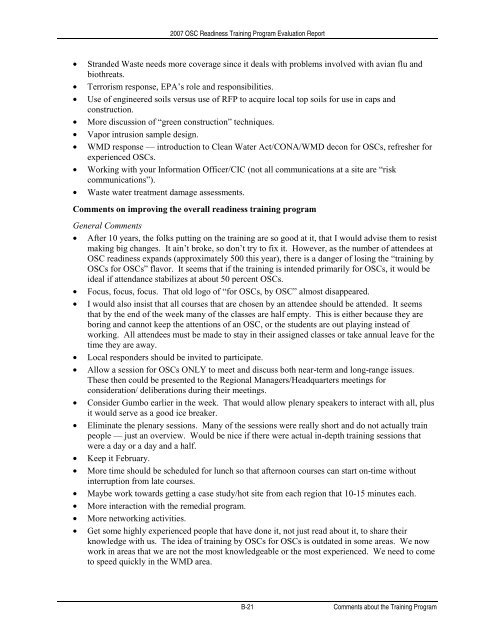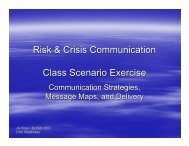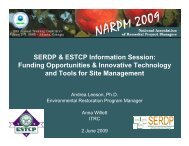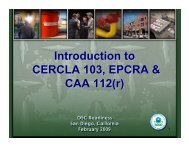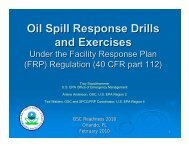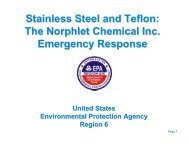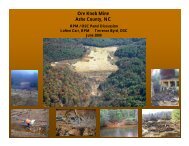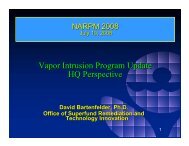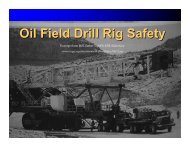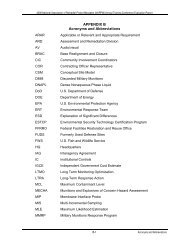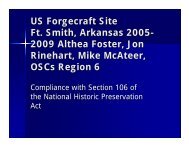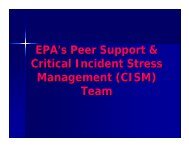OSC 2007 Evaluation Report
OSC 2007 Evaluation Report
OSC 2007 Evaluation Report
Create successful ePaper yourself
Turn your PDF publications into a flip-book with our unique Google optimized e-Paper software.
<strong>2007</strong> <strong>OSC</strong> Readiness Training Program <strong>Evaluation</strong> <strong>Report</strong><br />
• Stranded Waste needs more coverage since it deals with problems involved with avian flu and<br />
biothreats.<br />
• Terrorism response, EPA’s role and responsibilities.<br />
• Use of engineered soils versus use of RFP to acquire local top soils for use in caps and<br />
construction.<br />
• More discussion of “green construction” techniques.<br />
• Vapor intrusion sample design.<br />
• WMD response — introduction to Clean Water Act/CONA/WMD decon for <strong>OSC</strong>s, refresher for<br />
experienced <strong>OSC</strong>s.<br />
• Working with your Information Officer/CIC (not all communications at a site are “risk<br />
communications”).<br />
• Waste water treatment damage assessments.<br />
Comments on improving the overall readiness training program<br />
General Comments<br />
• After 10 years, the folks putting on the training are so good at it, that I would advise them to resist<br />
making big changes. It ain’t broke, so don’t try to fix it. However, as the number of attendees at<br />
<strong>OSC</strong> readiness expands (approximately 500 this year), there is a danger of losing the “training by<br />
<strong>OSC</strong>s for <strong>OSC</strong>s” flavor. It seems that if the training is intended primarily for <strong>OSC</strong>s, it would be<br />
ideal if attendance stabilizes at about 50 percent <strong>OSC</strong>s.<br />
• Focus, focus, focus. That old logo of “for <strong>OSC</strong>s, by <strong>OSC</strong>” almost disappeared.<br />
• I would also insist that all courses that are chosen by an attendee should be attended. It seems<br />
that by the end of the week many of the classes are half empty. This is either because they are<br />
boring and cannot keep the attentions of an <strong>OSC</strong>, or the students are out playing instead of<br />
working. All attendees must be made to stay in their assigned classes or take annual leave for the<br />
time they are away.<br />
• Local responders should be invited to participate.<br />
• Allow a session for <strong>OSC</strong>s ONLY to meet and discuss both near-term and long-range issues.<br />
These then could be presented to the Regional Managers/Headquarters meetings for<br />
consideration/ deliberations during their meetings.<br />
• Consider Gumbo earlier in the week. That would allow plenary speakers to interact with all, plus<br />
it would serve as a good ice breaker.<br />
• Eliminate the plenary sessions. Many of the sessions were really short and do not actually train<br />
people — just an overview. Would be nice if there were actual in-depth training sessions that<br />
were a day or a day and a half.<br />
• Keep it February.<br />
• More time should be scheduled for lunch so that afternoon courses can start on-time without<br />
interruption from late courses.<br />
• Maybe work towards getting a case study/hot site from each region that 10-15 minutes each.<br />
• More interaction with the remedial program.<br />
• More networking activities.<br />
• Get some highly experienced people that have done it, not just read about it, to share their<br />
knowledge with us. The idea of training by <strong>OSC</strong>s for <strong>OSC</strong>s is outdated in some areas. We now<br />
work in areas that we are not the most knowledgeable or the most experienced. We need to come<br />
to speed quickly in the WMD area.<br />
B-21 Comments about the Training Program


